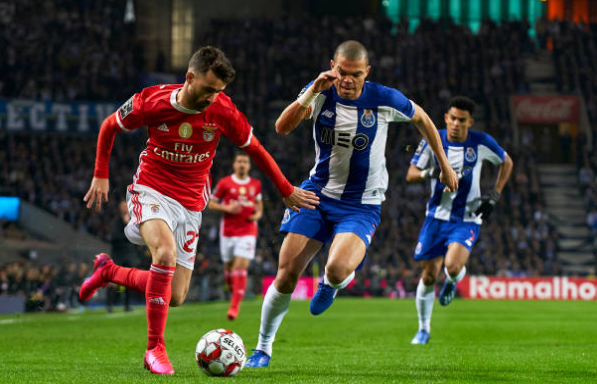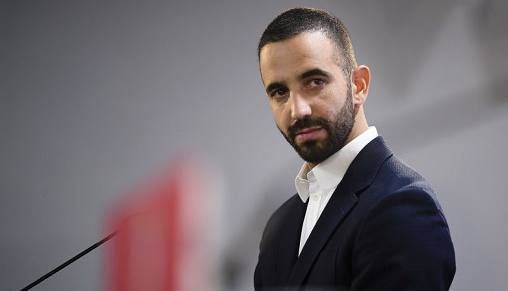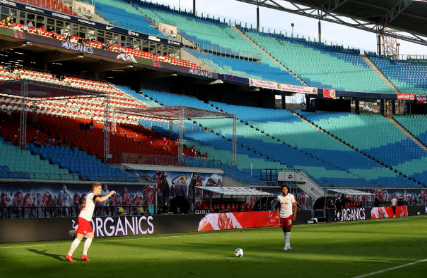 After months of extensive talks and cautious planning, fans of the Portuguese Primeira Liga can finally begin to countdown the hours ahead of its anticipated return, tomorrow night, registering its comeback with Gil Vicente’s away fixture versus Portimonense and FC Porto's renewed bid for the title away to FC Famalicão.
After months of extensive talks and cautious planning, fans of the Portuguese Primeira Liga can finally begin to countdown the hours ahead of its anticipated return, tomorrow night, registering its comeback with Gil Vicente’s away fixture versus Portimonense and FC Porto's renewed bid for the title away to FC Famalicão.
Taking a positive step towards normality, the football itself, after more than two months away and an enforced behind-closed-doors scenario, promises to be anything but your typical conclusion to a season.
As many Bundesliga clubs are beginning to find out, PortuGOAL explores the challenges and scenarios awaiting Liga NOS clubs once the ball finds its way back to the centre circle.
The peak of the interest will be dedicated to the bubbling title race being showcased by table-toppers Porto and bitter rivals Benfica, trailing the Dragons by a sole point in second place, just ten games away from the end of the season. The tight nature of the battle to be crowned champions of Portugal will certainly lead to tempting odds and a potential windfall if correctly picking the winner at ufabet.
And while the Porto camp may still be the ones with the biggest smile on their faces, at the summit of the league table, the enormity of Benfica’s relief is also difficult to ignore in this fierce tête-à-tête.
The Blue and Whites had claimed an 80% win ratio in their last six league games before the Primeira Liga’s suspension, whereas Benfica had tumbled down to 9th in the form table, amassing just eight points in the same span of games.
Almost three months down the line, the Eagles will have had plenty of time to patch up the spirits that once threatened to derail their season altogether back in March, welcoming back important figures, such as Gabriel, back into the fold with a title charge still very much intact.
On top of not being able to fully utilise their contrastingly good form up against Benfica, Porto’s fortunes have gone the other way with the loss of first XI mainstay Ivan Marcano to a ligament injury, making for an interesting tussle for success throughout the jam-packed months of June and July.
Time may also be an interesting ingredient in the fight for third place between Sporting de Braga and Sporting, caught at the infancy of fresh managerial tenures. For the latter, appointing Rubén Amorim from the former, the break may have been a good thing, allowing the young coach to set out his ideas away from the mid-season pressure and turbulence.
 Braga’s model is far more settled courtesy of Amorim himself, but Custodio also holds the same privileges as his former superior and it’ll be interesting to see just how his squad, currently four points ahead of the Lions, respond to the ex-player’s tactical tweaks and imprints after months of no football.
Braga’s model is far more settled courtesy of Amorim himself, but Custodio also holds the same privileges as his former superior and it’ll be interesting to see just how his squad, currently four points ahead of the Lions, respond to the ex-player’s tactical tweaks and imprints after months of no football.
Casual logic, after such an unprecedented break, may suggest that teams with a well-formulated plan are the most likely sides to resume seemingly, with the race for European places pinning three of the most well-coordinated teams in Rio Ave, Famalicão and Vitória de Guimarães all against each other.
At a point’s distance between fifth and seventh place, again, time could prove to be the healer of poor form, which is a potion that the outsiders, Famalicão, sorely need after seeing their powers wane in the wake of a blistering first half of the season, registering just three wins in 2020.
The same goes for hot relegation candidates Portimonense and last-placed Desportivo das Aves, hoping for a miraculous revival after failing to pierce through the 20-point-mark as of yet, meanwhile Paços de Ferreira, Marítimo, Belenenses and Tondela will all be fighting tooth and nail to steer themselves to safety.
No Home Advantage?
An interesting phenomenon which could play a part in the bid to stay up is the apparent loss of the standard home advantage, being felt right the way through the Bundesliga since its restart behind closed doors. Since the league’s first supporter-less fixture back in March, Germany’s top-flight has seen just eight out of 37 league games being won by the home side - just 21.6% of games in comparison to the standard 40-45% that most divisions are likely to see.
 This is a statistic that could bode well for a side like Tondela, currently just three points from safety in 14th, with the northern outfit registering just eight points when playing from the comfort of their own home - the worst in the league - as opposed to the 17 points accrued when taking up the role of visitors, placing them 7th in the away form table.
This is a statistic that could bode well for a side like Tondela, currently just three points from safety in 14th, with the northern outfit registering just eight points when playing from the comfort of their own home - the worst in the league - as opposed to the 17 points accrued when taking up the role of visitors, placing them 7th in the away form table.
Back at the very top, the picture sees Benfica outperform Porto by two points when acting as the away side, with the considerable drop-off in form falling to city neighbours Sporting, who are six points worse off when playing outside of the Alvalade. Rio Ave, on the other hand, follow Benfica in performing better when not at home.
Those at the very top tend to be well very supported wherever they go, however, and to have that taken away all of a sudden produces an interesting environment for smaller teams, habitually less reliant on a push from the stands, to thrive against some of the league’s biggest names.
The ‘12th man’s’ absence could well, and perhaps more crucially, extend itself to the men in the middle of the 22-player centrepiece - the referees and their officiating team. Rather than unsettling the stars of the away side with a cauldron-like atmosphere, the so-called home advantage, as many studies show, actually works its magic by pressuring the officials into favouring your cause.
A 2014 project led by Carnice Prendergast, Luis Garicano and Ignacio Palacios-Huerta detailed how on average, games in La Liga see 2.93 minutes of stoppage time given by officials. However, when the home side is chasing a result, pressure from the stands has the ability to push the average up to 3.95 minutes, whereas the scenario when defending a lead is far closer to just two minutes.
Additional studies also show that more penalties in Germany were historically awarded to teams with fans closer to the action, whereas the general officiating in Italy, when played behind closed doors, tends to be fairer and more accurate.
Never too far away from a spot of criticism or waves of fan pressure from row z downwards, the referee’s adaptation to this new form of football, with the added help from VAR, promises to be an interesting follow in a footballing environment as dedicated to controversy as Portugal’s.
Could that be the telling difference in ten games time for the 18 emblems involved, or is the mere lack of a rhythmic push from the stands enough to leave some of the league’s biggest stars devoid of inspiration? And just how much of an impact will the abrupt lockdown break have in teams’ form projections? The answers await.
By Patrick Ribeiro

